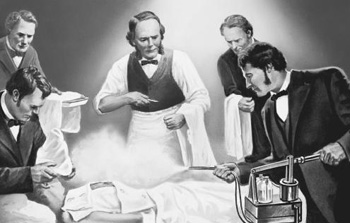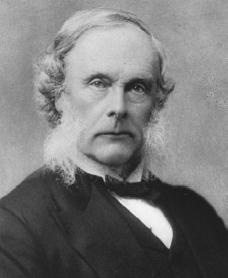 Joseph Lister helped make surgery a much safer undertaking. Before Lister’s discovery, surgery was a last resort because of the high rate of post-operative infections. People believe that it was bad air in a hospital that caused infections after surgery. Preventative measures to prevent infections and diseases included airing out a hospital during the day.
Joseph Lister helped make surgery a much safer undertaking. Before Lister’s discovery, surgery was a last resort because of the high rate of post-operative infections. People believe that it was bad air in a hospital that caused infections after surgery. Preventative measures to prevent infections and diseases included airing out a hospital during the day.
Pasteur’s research which showed that the presence of micro-organisms caused rotting and fermentation was the basis for Lister’s research to make surgery safer. Pasteur suggested three ways to eliminate these organisms. One of these methods was exposure to chemical solutions.
Carbolic acid, a chemical which was used to deodorize sewage, was Lister’s chemical of choice. In August of 1865, Lister experimented with the chemical on the leg fracture of an eleven year old boy. He applied bandages dipped in carbolic acid to the leg wound. He removed the first bandages after four days and there was no sign of infection. After continuing to dress the wound with carbolic acid for six weeks, the boy’s leg healed perfectly with no signs of infection.
 During Lister’s time, babies delivered by mid-wives had a much lower mortality rate that those delivered by doctors. Lister became aware of this and determined correctly that it was because mid-wives washed their hands more than a normal doctor. Doctors would often perform multiple surgeries during the day and never wash their hands which meant the germs from one patient were easily spread to the doctor’s subsequent patients.
During Lister’s time, babies delivered by mid-wives had a much lower mortality rate that those delivered by doctors. Lister became aware of this and determined correctly that it was because mid-wives washed their hands more than a normal doctor. Doctors would often perform multiple surgeries during the day and never wash their hands which meant the germs from one patient were easily spread to the doctor’s subsequent patients.
Lister understood that the answer to safer surgery was to prevent the spread of germs into surgical wounds. He had many suggestions for procedures which would lead to sterile surgery. He wanted surgeons to wear gloves and wash their hand with carbolic acid solutions before and after surgery. Instruments, he suggested, needed to be cleaned in the solution. Another one of his ideas was to spray the surgical theater with the solution. This spray led to a very uncomfortable working environment and the practice was quickly stopped.
Lister’s work and the publication of his findings has earned him the title “the father of modern antisepsis.” Listerine mouth wash was named in honor of Lister. Until his death in 1912, Lister continue to research and work to make surgeries infection free.
